By visiting our site, you agree to our privacy policy regarding cookies, tracking statistics, etc.
MCD has its own production facility in Wuxi, China. With a production capacity of two million gaskets per year, we manufacture every type of gasket, whatever the size, for all makes and models of plate heat exchangers.

YEARS' EXPERTISE

CUSTOMERS IN 90 COUNTRIES

GASKETS MANUFACTURED EACH YEAR

COMMITTED EMPLOYEES
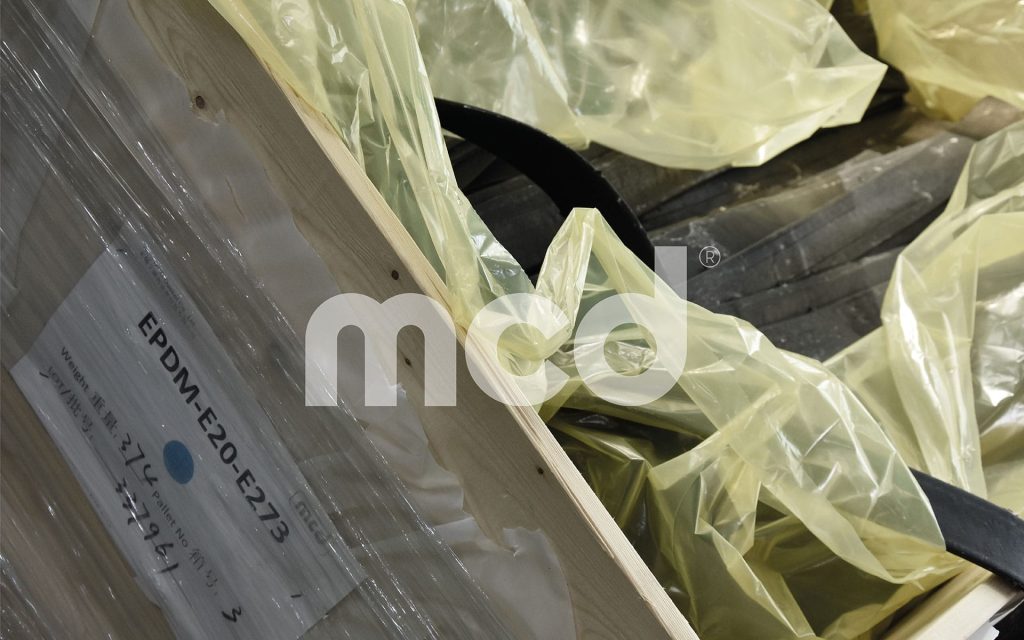
All our compounds and elastomers come from Europe to guarantee high-quality products
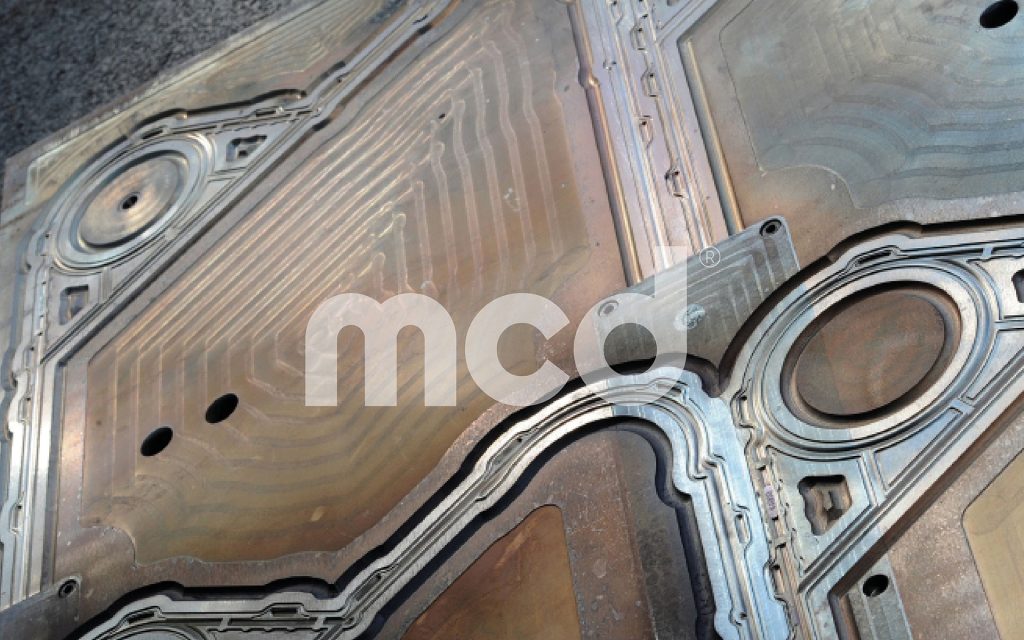
MCD manufactures its own molds, on its site in Wuxi, which allows to be flexible and reactive.
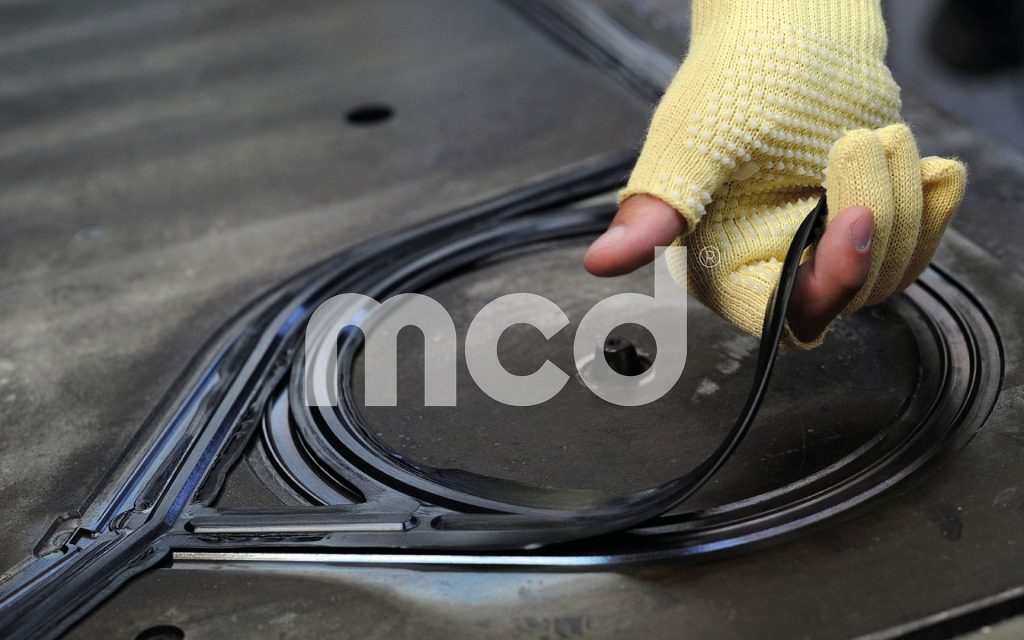
After a first step of extrusion, MCD vulcanizes the rubber in presses (17 in total, from the smallest to the largest models).
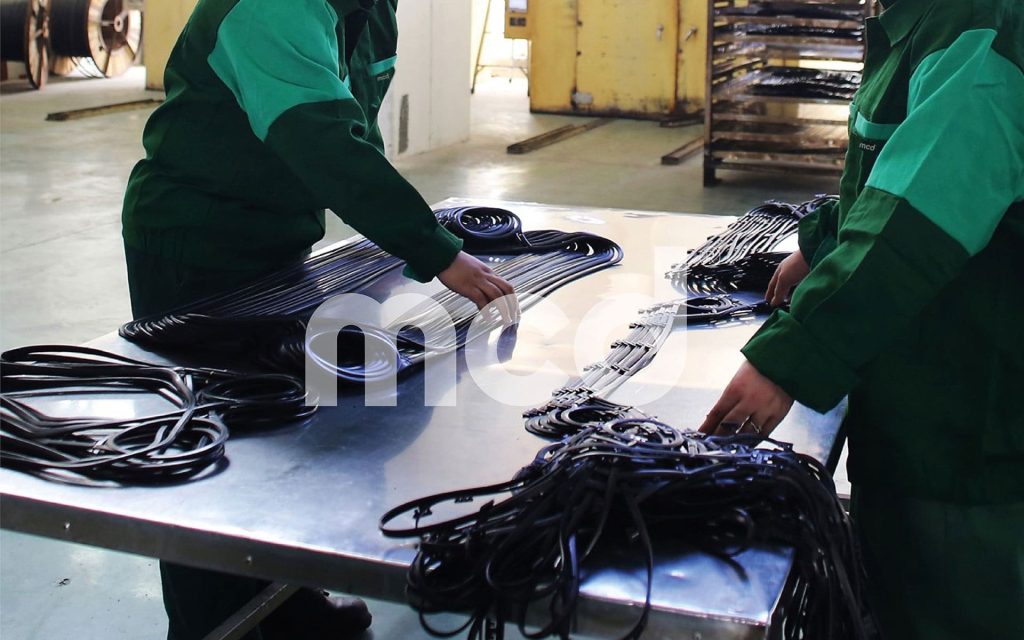
All gaskets are manually and individually controlled before being analysed in our lab in order to check their conformity to MCD quality standards.
A plate heat exchanger is designed to transfer the heat energy from one fluid to another that have originally different temperatures.
For example, a hot flow will get cooler while the cold flow will get hotter thanks to the paralleled traffic of both ones. The plates heat exchanger is composed by several chevronned plates (usually aluminum, stainless steel or hastelloy) to fit together. The thickness of the plates is generally between 0.1 and 0.8 mm. They are stuck together either by welding or using gaskets to permit to have not much space between them and seal them.
In many heat exchangers the flows usually follow the same process. The different ways of circulation have an impact on the efficiency and the quality of the transfer. A heat exchanger which makes two flows entering on the same side is named one way running. A heat exchanger which makes two flows circulate countercurrent is named methodic. Usually, the methodic type is considered as more efficient.
Drawing of alternating flow heat transfer:
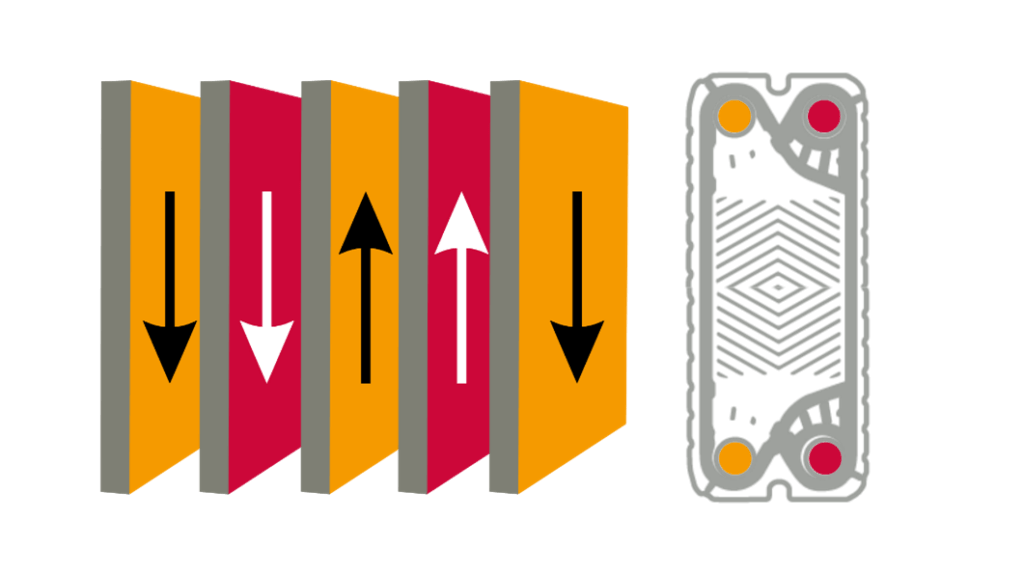
There are two kinds of heat movement: the monophasic one and the dysphasic one
The monophasic movement consists in mixing two flows (gas or liquid) without any change of state (liquid at the beginning of the process and liquid at the end). This exchange works thanks to the decrease or the rise of temperature.
The dysphasic movement consists in mixing two flows too but with a change of state. For example, in a plate evaporator, both flows are in a liquid state at the beginning and become a gas at the end of the process.
The plate heat exchangers can have either a monophasic movement (as sterilizer, pasteurizer…) or a dysphasic one (as evaporator, condenser, air-conditioner…).
In the family of plate heat exchangers, we are going to talk about two types of plate heat exchangers: the welded plates and the gasketed ones.
The welded plate heat exchangers are compacts and resisting to the high pressure. Generally, they are made with stainless steel plates. The welded plate heat exchangers can resist about thirty bars.
The plate 0076 heat exchangers are known for their easiness of maintenance. This type of heat exchanger is designed to be easily disassembled and reassembled it is thinking for the disassembly and the assembly of them. Thanks to the configuration, it is possible to add some plates in order to increase its heating transfer surface.
The gasketed plate heat exchangers present several advantages like the evolution of itself along the time, the easy opening, the circuit cleaning, the efficiency of the flow exchange, the easy way to install and the gasket choice.
On the market, there are two kinds of gaskets: the glued gaskets and the free-glued (clipped) gaskets. These gaskets are made from an elastomer composition (which is one of the polymers).
The glued gaskets are stuck to the plates thanks to an epoxy glue which is composed of resin and curing agent. This glued solution is an alternative to the welding and is known for its lifetime and for its resistance to the water. The glued gaskets are also known for their capacity to remain in place when you must open a plate heat exchanger.
The free-glued (clipped) gaskets are installed thanks to a special fixing system (that depends on the plate heat exchanger brand) which is perfectly fitting the dedicated grooved spaces on the plate. These gaskets are known to be often changed in some applications (Industries that use aggressive products notably)
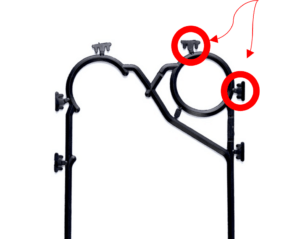
The acronym OEM means Original Equipment Manufacturer. A gasket made by an OEM company means a manufacturer can offer for sale original products for a type of heat exchanger. For example, an OEM like Alfa Laval, Sondex, Tranter etc. will sell as spare parts their original gaskets and only original ones.
Generally, if a customer wants to buy a specific gasket from a specific brand, they will directly contact the brand. It will be a high-quality product.
The equivalent gaskets are simply non-OEM gaskets, usually called “copy”. They are designed to have many similar characteristics to original ones. Some equivalent gasket manufacturers could be low quality, but others could be even higher quality than the OEM ones.
The equivalent gaskets usually have the same characteristics than the OEM ones and you can find them, on the market, sometimes at reduced price with an identical quality to constructor’s ones. Thanks to a technical expert team dedicated to quality and a real customer service, the equivalent gasket manufacturers become more present on the market of gaskets for plate heat exchangers.
The OEMs are usually more expensive as customers pay the manufacturer’s reputation.
It is important to look for the raw materials which are essential for the manufacture of gaskets. To have a high-quality gasket you need to check the raw materials but not only. The know-how and the great expertise of its manufacturer are also important to the quality of the gaskets.
So the quality of the raw material, the experience of the manufacturer, the technical and sales support are important to ensure a high quality gasket, guaranteed by the manufacturer of the equivalent gasket.
MCD is a manufacturer of equivalent gaskets since 1969 known in the biggest food, marine and industrial groups all over the world. Since 2010, MCD has been certificated MASE and since 2015, the company has been certificated ISO 9001 and 14001.
MCD has the largest range of gaskets and elastomers on the market. If you need an Alfa LAVAL, an APV-SPX, a Sondex, a Tranter or another brand’s gasket choose MCD to find the exact gasket you need. As a manufacturer of equivalent gaskets, MCD develops his own tools to respond to the customers’ requests. And if you are looking for a gasket which is not in our gasket range, do not hesitate to contact us, this range being extended regularly in order to match your needs. Every year, MCD creates more than 20 new references.
With the biggest service center in Europe dedicated to the plate heat exchanger, MCD uses its own gaskets to make the maintenance of customers’ plate heat exchangers in France, Belgium, Luxembourg, and Switzerland. MCD supplies its gaskets to the biggest actors on the market of maintenance for plate heat exchangers around the world (in 90 countries).
In its continuous improvement policy, MCD hired a technical support team specialized in the product quality to give the high-quality gaskets on the market. Our team can also support you to give you some advice with your choices.
When you reach MCD, you have a dedicated contact to ensure you a fast and personalized service guaranteeing the good processing of your request.
MCD guarantees its gaskets for one year as per the OEMs. The raw materials used by MCD are all sourced in Europe to certify the good quality of the products.
For more information, feel free to contact us !
© Group MCD – Sitemap – Terms of Sales – Privacy Policy – Legal notice